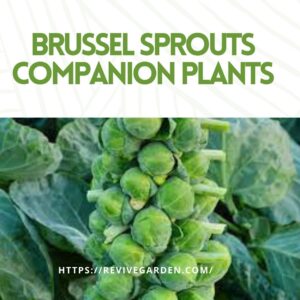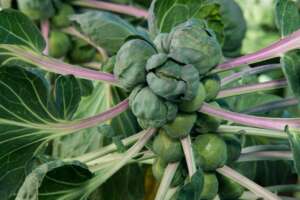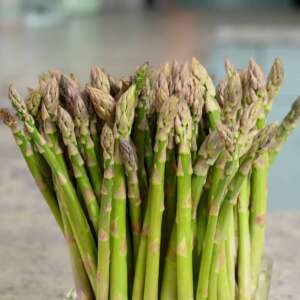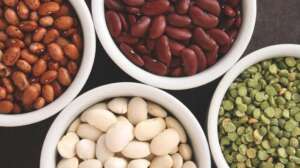Table of Contents
Brussel Sprouts have gained popularity in recent years, which is great if you like them. But what do you do if you don’t? Should you grow them alone, or should you grow them with companion plants to make it easier for yourself to harvest, weed, and take care of Brussel Sprouts? In this article, we’ll answer that question and tell you why growing companion plants around your Brussel Sprouts is a good idea and list some companion plants that work well.
 Brussel Sprouts Companion Plants – What Is It?
Brussel Sprouts Companion Plants – What Is It?
You may have heard that Brussel sprouts grow well with peas, pumpkins, or any number of combinations. Considering the fact that Brussel sprouts are a biennial plant (typically taking two years to grow), companion plants are very important to consider when it comes time for the second year of growth. So, let’s talk about what makes for good prospects to be planted alongside your Brussel sprouts.
History of Brussel sprouts
The Ancient Romans cultivated the Brussels sprout, and it was introduced into Britain as cabbages by the Romans during their occupation of southern England between 43AD-410AD. It may be named after either the Belgian capital city of Brussels or after the Flemish word for cabbage.
Brussel Sprout
They have small yellow flowers on a tall stalk pollinated by bees. The edible portion is the enlarged leaf bud.
Brussel sprouts grow in small clusters on an erect stem that can reach up to 40 cm (16 in) tall. The leaves are dark green and coarsely textured. Brussels sprouts are typically boiled or steamed but may be eaten raw in salads.
The larger cultivars have fewer leaves and a larger bud; smaller varieties have many leaves forming a loosehead about 5–10 cm (2–4 in) across. The colour of the leaves ranges from dark green to bright yellow, depending on variety and age.
Suitable temperature for Brussel Sprout

Brussel sprouts are a cool-season crop that can be planted in early spring and planted again in late summer for a fall harvest. This is a versatile vegetable that can be grown in many different climates. It will grow best in cooler weather conditions but will tolerate hotter temperatures if provided with plenty of shade. Brussel sprouts have the ability to grow well in most soil types, but they do need rich soil that drains well. They also prefer full sun and loose, fertile soil, which provides them with good drainage. If your soil is heavy or clay-like, it may need to be amended before you can plant your Brussel sprouts.
Brussel Sprout Pests
Several pests can attack your Brussel sprouts, but there are also companion plants that will help keep these pests away.
Several pests love to eat Brussel sprouts, including aphids and Japanese beetles. Aphids are small, green insects that can suck the life out of your brussel sprout plants quickly. One aphid can lay as many as 50 eggs in one day! Japanese beetles can also be a problem for your brussel sprout plants because they feed on the leaves of these plants instead of the roots or stems, as many other pests do.
Luckily some companion plants help keep these pests away from your Brussel sprouts by attracting them away from your garden or yard. These include:
List of companion plants
They need about 100 days of frost-free growing to produce a good harvest.
Arugula – Basil – Bay Leaf – Beets – Borage – Broccoli – Brussels sprouts – Beans, bush and pole – Cabbage (All) – Carnations – Chives – Cilantro – Collards – Cornflower – Cosmos – Cauliflower – Carrots – Dill – English Daisy – Fennel – Garlic – Garlic Chives – Horseradish – Kohlrabi – Nasturtiums – Onions – Oregano – Parsley – Rosemary – Sage – Tarragon
Details
Asparagus

Asparagus is a long-lived perennial plant that produces shoots that are eaten. Asparagus grows best in full sun to partial shade conditions and needs moist soil with good drainage. The asparagus plant prefers a pH between 6.0 and 7.0, although it will tolerate a range of soil conditions. Asparagus is not tolerant of salty soils, so if you live near the coast, it’s best to choose another companion plant if possible.
Basil (Ocimum basilicum)
Basil repels aphids and is especially good for pesto.
Chamomile (Matricaria recutita)
Chamomile is a natural repellent against most pests, including whiteflies, aphids, and thrips. Chamomile also helps keep your soil healthy by adding organic matter and suppressing soil-borne diseases like Pythium.
Fennel (Foeniculum vulgare)
Fennel has been shown to repel aphids, whiteflies, spider mites and ants when planted near your Brussel sprouts. Fennel is also known for its ability to help reduce nematode populations in garden soils by as much as 80 %.
Beans

Beans fix nitrogen in the soil and provide structure for climbing plants like peas and beans.
Melons
Melons grow best when planted next to corn or pole beans because these plants help to deter pests that tend to attack melons.
Potatoes
Potatoes should be planted near tomatoes or eggplant because these plants emit ethylene gas, which helps prevent premature potato ageing and sprouting.
Health benefits
Like many other vegetables, Brussel sprouts are packed with nutrients that are good for your health. The following are some of the benefits of Brussel sprouts and their companion plants:
Brussel sprouts are a member of the cabbage family, and they’re cousins to broccoli, kale, and cauliflower. They’re also known as “Brussels” or “Brassica oleracea gemmifera.” This vegetable has been around since Roman times and was cultivated by monks in Belgium during the 6th century.
Even though Brussel sprouts may not be at the top of your list of favourite foods, there are plenty of health benefits associated with eating them. Here are just a few:
- They can help lower blood pressure and cholesterol levels.
- Eating brussels sprouts regularly can prevent cancer because they contain glucosinolates that have been shown to kill cancer cells in laboratory experiments.
- These vegetables contain fibre that helps with digestion and lowers cholesterol levels and blood pressure by keeping your bowels moving properly, so waste products don’t remain in your intestines too long.
Final words
When planting Brussel sprouts, it is important to consider the companion plants. This article provides a list of the best companion plants for Brussel sprouts and their benefits. By following the advice in this article, you can ensure that your Brussel sprouts are healthy and produce a bountiful harvest.
